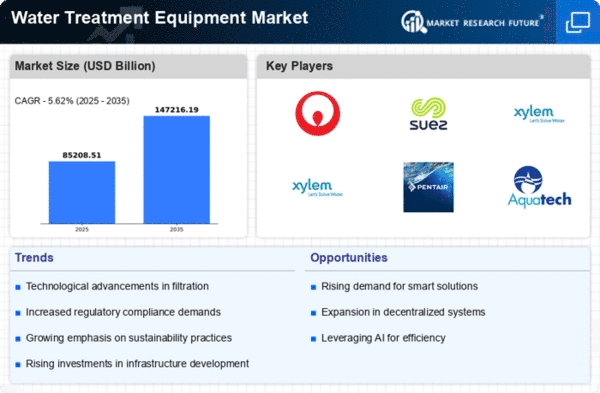Top Industry Leaders in the Water Wastewater Treatment Equipment Market

*Disclaimer: List of key companies in no particular order
Top listed global companies in the industry are:
- E. Water & Process Technologies (U.S.)
- Aquatech International Corporation (U.S.)
- Veolia Water Technologies (France)
- WPL Limited (U.K.)
- Fluence Corporation Limited (U.S.)
- Napier Reid Ltd. (Canada)
- Calgon Carbon Corporation (U.S.)
- Xylem Inc. (U.S.)
- Kemira Oyj (Finland)
- Corix Water System (Canada)
- Among others.
Flowing Profits: Navigating the Competitive Landscape of the Water and Wastewater Treatment Equipment Market
The water and wastewater treatment equipment market, the unsung hero ensuring clean water flow, bubbles with intense competition. Understanding the strategies, metrics, and innovations shaping this dynamic market is crucial for companies seeking to quench their thirst for success.
Key Players and their Strategies:
- Global Giants: Industry Titans like Siemens, Veolia, and Xylem leverage their extensive reach, diverse product portfolios, and technological prowess to maintain market leadership. Siemens, for instance, emphasizes integrated water management solutions with smart technologies.
- Regional Powerhouses: Regional players like Grundfos (Denmark), Evoqua Water Technologies (US), and CNP Engineering India Ltd. cater to specific regional needs and price sensitivities with efficient production and cost-effective offerings. CNP Engineering's strong presence in the Indian market exemplifies this strategy.
- Specialized Experts: Companies like Evoqua Water Resources (US) and AQUALIS Group (Switzerland) carve niches by specializing in advanced or niche technologies like membrane filtration, desalination, or wastewater reuse solutions. Evoqua Water Resources' expertise in membrane bioreactors showcases this specialization.
Factors for Market Share Analysis:
- Technical Innovation: Development of efficient and sustainable technologies for filtration, disinfection, and waste removal directly impacts resource utilization and operating costs. Siemens' focus on smart automation and Veolia's innovations in membrane separation technologies exemplify this emphasis.
- Cost-Effectiveness and Affordability: Balancing advanced features with affordability is crucial for market penetration, especially in developing regions. CNP Engineering's focus on cost-efficient wastewater treatment solutions for rural areas demonstrates this approach.
- Regulatory Compliance: Stringent environmental regulations necessitate adherence to specific treatment standards and certifications. Xylem's focus on regulatory compliant disinfection systems exemplifies this commitment.
- Sustainability Focus: Growing focus on water conservation, energy efficiency, and circular economy principles drives development of resource-efficient equipment and solutions for reuse and recycling. Evoqua Water Resources' focus on wastewater reuse technologies and AQUALIS Group's emphasis on energy-efficient treatment processes demonstrate this trend.
Emerging Trends and Company Strategies:
- Digitalization and Data-Driven Solutions: Integrating sensors, automation, and real-time data analytics optimizes treatment processes, minimizes downtime, and enables predictive maintenance. Siemens' MindSphere platform and Xylem's Water Intelligence solutions exemplify this shift.
- Modular and Decentralized Treatment Systems: Compact and flexible treatment solutions are gaining traction for remote locations, industrial applications, and decentralized water management. Grundfos' pre-assembled treatment units and CNP Engineering's modular wastewater treatment plants showcase this trend.
- Alternative Water Sources: Desalination, rainwater harvesting, and wastewater reuse technologies are becoming increasingly crucial to address water scarcity challenges. Veolia's expertise in desalination plants and Evoqua Water Resources' focus on wastewater reuse solutions demonstrate this trend.
- Partnerships and Collaborations: Partnerships between equipment manufacturers, research institutions, and water management authorities foster innovation, accelerate market penetration, and address specific regional challenges. Xylem's collaborations with water utilities on smart infrastructure projects and AQUALIS Group's partnerships with research institutes on advanced treatment technologies exemplify this approach.
Overall Competitive Scenario:
The water and wastewater treatment equipment market is a dynamic and complex landscape, fueled by technological advancements, regulatory changes, growing demand for clean water, and sustainability concerns. Success hinges on continuously refining key strategies like technological leadership, cost-effectiveness, regulatory compliance, and adaptability. Embracing digitalization, exploring modular solutions, developing sustainable technologies, and fostering collaborative partnerships are essential for navigating the competition and ensuring consistent flow in this vital market.
Latest Company Updates:
October 2023- US tech startup Laero has unveiled a compact water treatment system at Dutch Design Week, which it claims can be installed under any sink to recycle up to 80 percent of the water. Cycleau is a stand-alone system that uses three different filtration processes to transform grey water into drinking water. The design could make wastewater recycling accessible to any household, including low-income families and individuals, according to Laero founder Noemi Florea. She told the firm that the majority of the systems and technologies to treat water are inaccessible to the average person because they are either too big, spanning entire municipal facilities, or too expensive to install. She further added that it shows how the equipment could be scaled down into a compact unit that could be low-cost and easy to install. Florea first developed the concept as a student at the Parsons School of Design in New York. She has since secured over USD50,000 (£41,200) in funding from grant programs, including the Swarovski Foundation Creatives for Our Future and MIT Solve.
October 2023- Vermont grants USD 3.3 million to businesses for treating wastewater. Producers of alcohol, syrup, and cheese are among the eight businesses chosen by the state's Department of Environmental Conservation to receive the grants, which would help them treat their wastewater before it enters the public system. While most of Vermont's public wastewater is treated in large municipal facilities, new state funding is set to help some businesses with particularly potent wastewater to treat it at the source.

